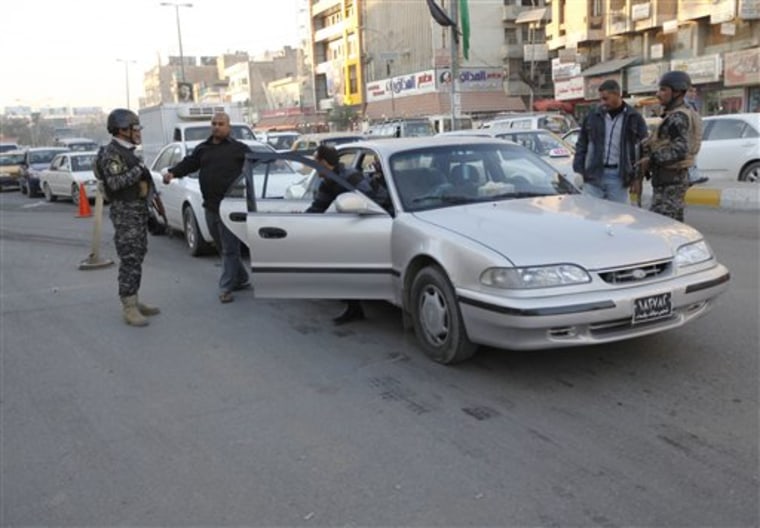The last U.S. troops will be out of Iraq by the end of 2011, Prime Minister Nouri al-Maliki says.
In a two-hour interview published by The Wall Street Journal on Tuesday, al-Maliki said his country's security forces can handle any remaining security threats beyond the mutually agreed year-end pullout date established with the Bush administration in 2008.
"The last American soldier will leave Iraq," he said, according to the Journal. "This agreement is not subject to extension, not subject to alteration. It is sealed."
The Journal said it spoke to al-Maliki in his Baghdad office inside the protected Green Zone.
It was al-Maliki's first interview since Iraq ended a nine-month election stalemate and seated a new government, allowing the prime minister to begin his second term.
The Obama administration, working within the Bush administration deadline, already withdrew combat troops from Iraq by the end of August, leaving fewer than 50,000 troops on a training and advisory mission.
"The prime minister is exactly right," The Journal quoted a senior White House official Tuesday as saying. The Obama administration was "on track" to withdraw remaining soldiers by the end of 2011.
Extension negotiable
Al-Maliki left the door open for an extension if the two nations negotiate—with the approval of Iraq's Parliament—a new Status of Forces Agreement, or SOFA, similar to the one concluded in 2008, the Journal said.
Despite border airspace security deficiencies, al-Maliki said Iraq won't need major help from the U.S. military.
"Not a single militia or gang can confront Iraqi forces and take over a street or a house," al-Maliki told the Journal. "This is finished; we are comfortable about that."
He also said Iraq will not form an alliance with Iran after the U.S. pullout is complete.
"For Iraq to be dragged into an axis or an orbit, that's impossible, and we reject it whether this comes from Iran, Turkey or the Arabs," he said.
Checkpoint reduction studied
Al-Maliki's comments were reported as Iraq's leaders investigatied the possibility of removing some of Baghdad's hundreds of much hated checkpoints because of the improving security situation, said the city's military spokesman Tuesday.
Maj. Gen. Qassim al-Moussawi said that al-Maliki has asked commanders to evaluate the security situation in Baghdad and decide which of the roughly 870 checkpoints that dot the city can be removed.
The checkpoints are manned by Iraqi soldiers and police and designed to catch insurgents, but they also slow down traffic in the already congested city.
As security has improved, the prime minister started last year to remove some of the concrete blast walls that snake their way across the city, dividing neighborhoods and protecting buildings. The blast walls and checkpoints give the city, slowly recovering from years of violence, the air of being under a military occupation.
The decision is fraught with risk. Last year the removal of some of the walls was followed by a series of deadly blasts targeting government institutions, killing hundreds of people and some of the concrete barriers went back up.
Baghdad residents generally abhor the checkpoints which can make life unbearable for people going to work or school. Each Baghdad resident has a story about being stuck at a checkpoint for an hour or more.
"Checkpoints are a useless measure because they just ask people 'Are you carrying weapons?' and they say no and they check the trunk and that's all," said 19-year-old taxi driver Lwaa Adnan, who carries students to Baghdad University every day.
When asked how many checkpoints he passes through on a daily basis, Adnan counted at least six he must negotiate to get from his neighborhood in northern Baghdad to the university in the southern part of the city.
Another driver described in frustration of how high-ranking government officials in their security convoys with lights flashing bypass the long line of vehicles at the checkpoints while regular citizens are forced to stew, sometimes for hours.
Even more frustrating, is that most Baghdadis don't even consider the checkpoints to be remotely effective.
Security forces at the checkpoints use a wand-like, handheld mechanism made in the U.K. that is supposed to be able to detect explosives in passing vehicles but has been widely discredited. British authorities have banned its export to Iraq and Afghanistan after a report raised serious questions about it.
"This explosives detector just points if you have cleaning supplies or perfume in your car," said Amnea Waleed, a 23-year-old college student.
Iraqi officials maintain the machines are useful, and say that checkpoints have their place in maintaining security.
The captain in charge of one checkpoint in the Karradah neighborhood said less than a week ago his men found a bomb attached to the undercarriage of a minibus and defused it.
But Capt. Odai Hamid Allah Ali said he understands drivers get frustrated at having to wait in line and that removing the concrete blast walls and checkpoints could help bring back some of Baghdad's once fabled beauty.
Al-Moussawi said a committee tasked with evaluating the security situation would make a recommendation to al-Maliki in a week on whether some checkpoints can be removed and if so how many. The prime minister will make the final decision.
